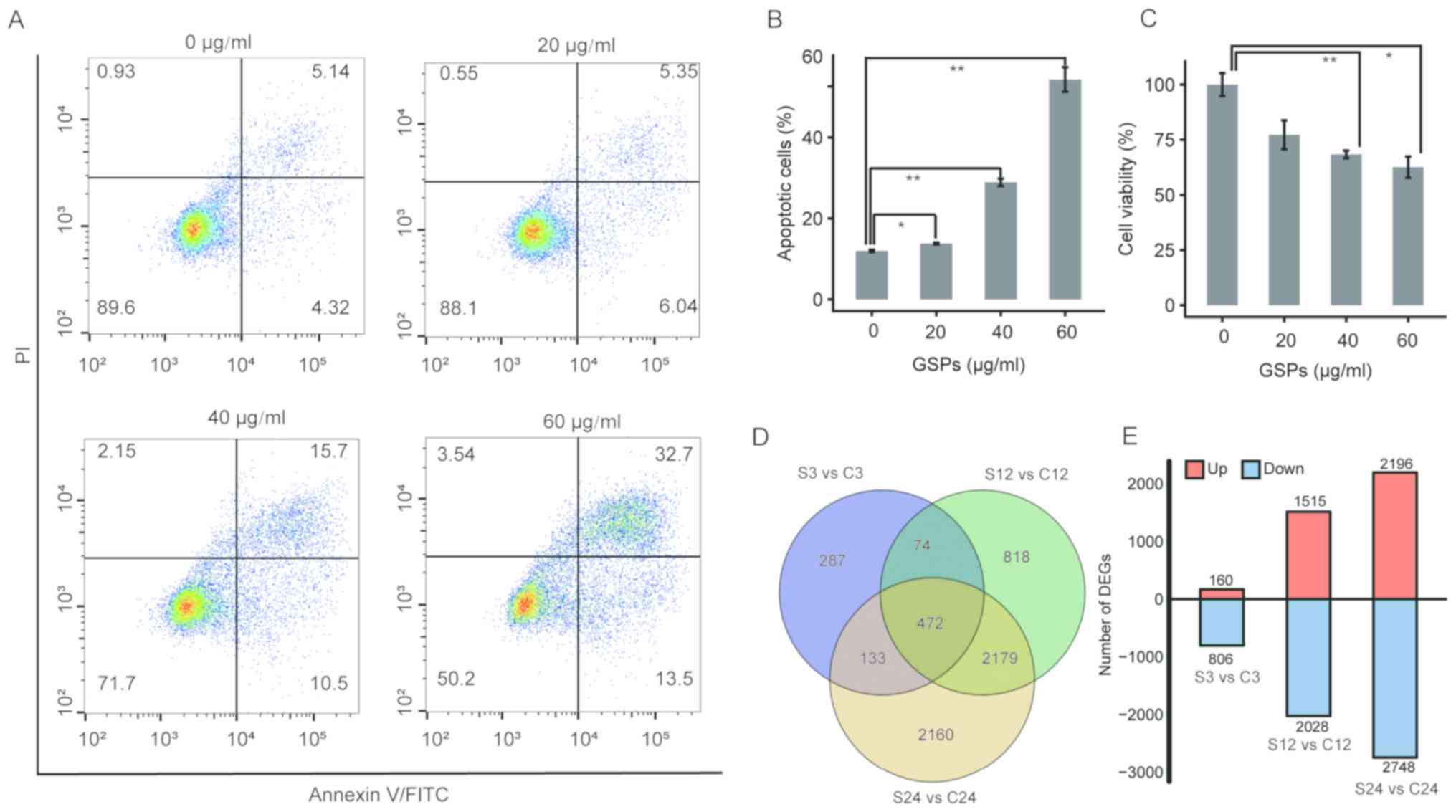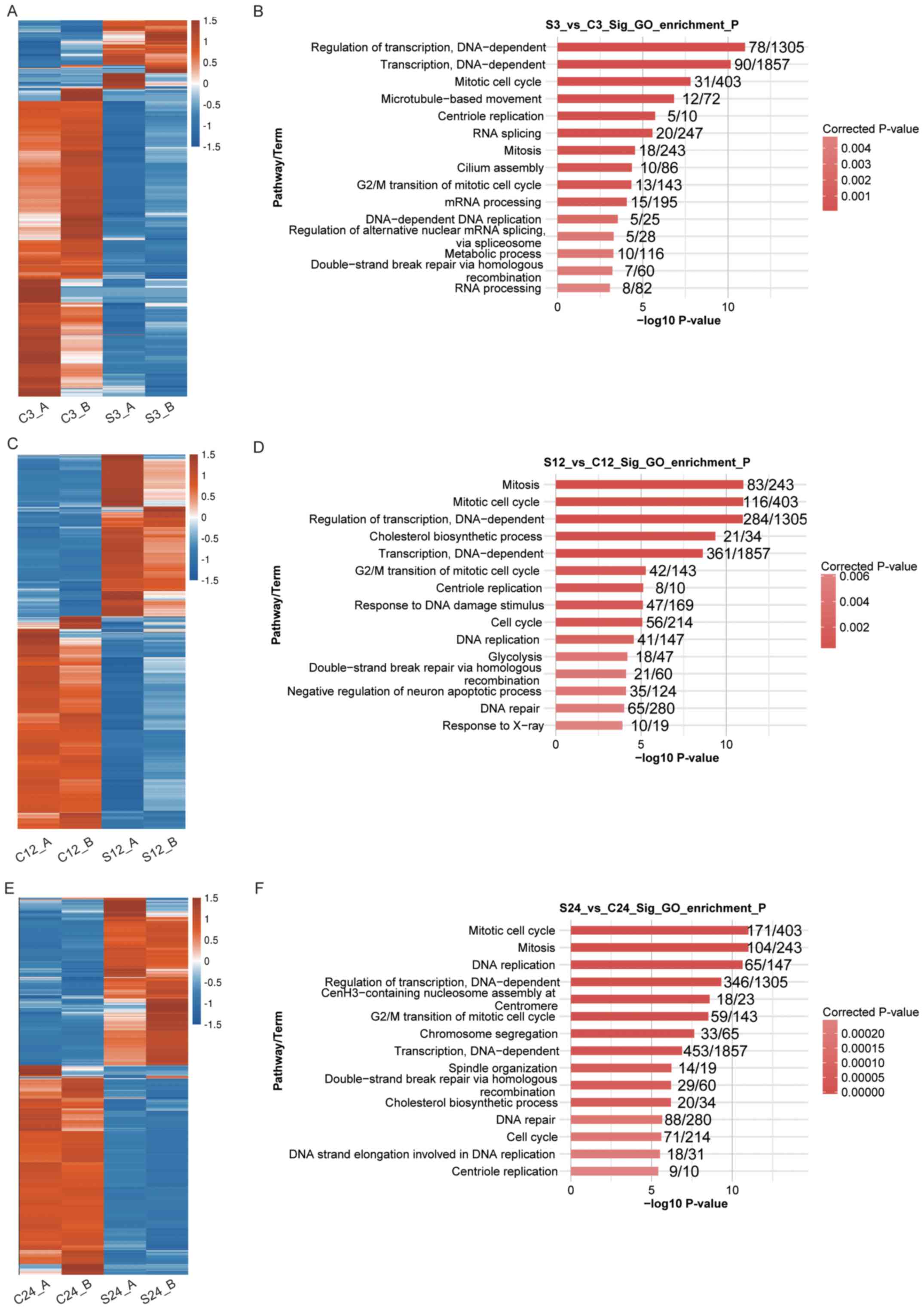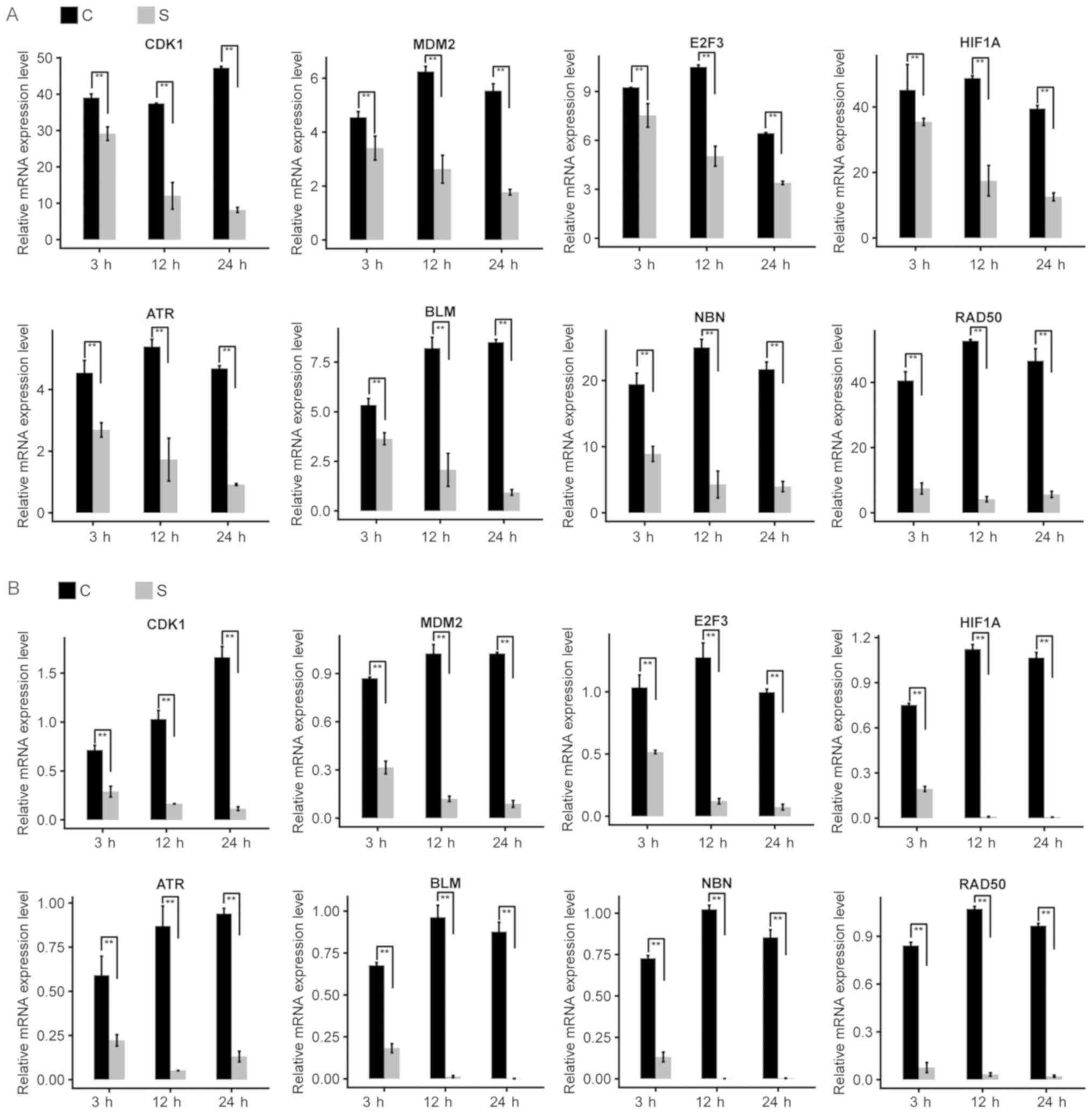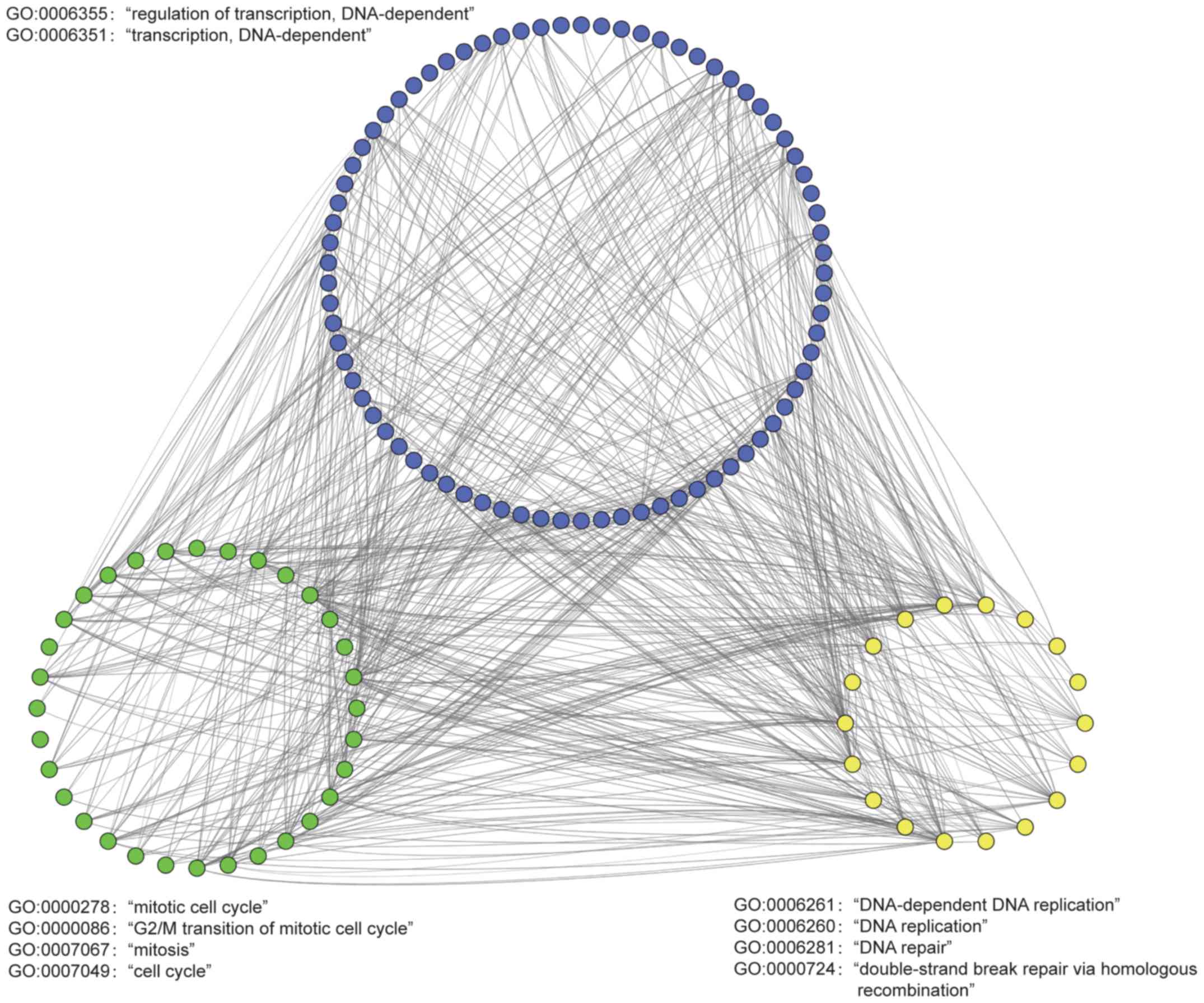|
1
|
Kamisawa T, Wood LD, Itoi T and Takaori K:
Pancreatic cancer. Lancet. 388:73–85. 2016. View Article : Google Scholar : PubMed/NCBI
|
|
2
|
Huang X, Zhi X, Gao Y, Ta N, Jiang H and
Zheng J: LncRNAs in pancreatic cancer. Oncotarget. 7:57379–57390.
2016.PubMed/NCBI
|
|
3
|
Yeo TP, Hruban RH, Leach SD, Wilentz RE,
Sohn TA, Kern SE, Iacobuzio-Donahue CA, Maitra A, Goggins M, Canto
MI, et al: Pancreatic cancer. Curr Probl Cancer. 26:176–275. 2002.
View Article : Google Scholar : PubMed/NCBI
|
|
4
|
Li D, Xie K, Wolff R and Abbruzzese JL:
Pancreatic cancer. Lancet. 363:1049–1057. 2004. View Article : Google Scholar : PubMed/NCBI
|
|
5
|
Rajkumar SV and Moreau P: Decade in
review-haematological cancer: Advances in biology and therapy. Nat
Rev Clin Oncol. 11:628–630. 2014. View Article : Google Scholar : PubMed/NCBI
|
|
6
|
Gisselbrecht C and Sibon D: New
perspectives in the therapeutic approach of peripheral T-cell
lymphoma. Curr Opin Oncol. 30:285–291. 2018.PubMed/NCBI
|
|
7
|
Lee Y: Cancer chemopreventive potential of
procyanidin. Toxicol Res. 33:273–282. 2017. View Article : Google Scholar : PubMed/NCBI
|
|
8
|
Bagchi D, Bagchi M, Stohs S, Ray SD, Sen
CK and Preuss HG: Cellular protection with proanthocyanidins
derived from grape seeds. Ann N Y Acad Sci. 957:260–270. 2002.
View Article : Google Scholar : PubMed/NCBI
|
|
9
|
Dixon RA, Xie DY and Sharma SB:
Proanthocyanidins-a final frontier in flavonoid research? New
Phytol. 165:9–28. 2005. View Article : Google Scholar : PubMed/NCBI
|
|
10
|
Katiyar SK: Grape seed proanthocyanidines
and skin cancer prevention: Inhibition of oxidative stress and
protection of immune system. Mol Nutr Food Res. 52 Suppl 1:S71–S76.
2008.PubMed/NCBI
|
|
11
|
Bagchi D, Bagchi M, Stohs SJ, Das DK, Ray
SD, Kuszynski CA, Joshi SS and Pruess HG: Free radicals and grape
seed proanthocyanidin extract: Importance in human health and
disease prevention. Toxicology. 148:187–197. 2000. View Article : Google Scholar : PubMed/NCBI
|
|
12
|
Du Y and Lou H: Catechin and
proanthocyanidin B4 from grape seeds prevent doxorubicin-induced
toxicity in cardiomyocytes. Eur J Pharmacol. 591:96–101. 2008.
View Article : Google Scholar : PubMed/NCBI
|
|
13
|
Rossi M, Negri E, Parpinel M, Lagiou P,
Bosetti C, Talamini R, Montella M, Giacosa A, Franceschi S and La
Vecchia C: Proanthocyanidins and the risk of colorectal cancer in
Italy. Cancer Causes Control. 21:243–250. 2010. View Article : Google Scholar : PubMed/NCBI
|
|
14
|
Singh T, Sharma SD and Katiyar SK: Grape
proanthocyanidins induce apoptosis by loss of mitochondrial
membrane potential of human non-small cell lung cancer cells in
vitro and in vivo. PLoS One. 6:e274442011. View Article : Google Scholar : PubMed/NCBI
|
|
15
|
Prasad R, Vaid M and Katiyar SK: Grape
proanthocyanidin inhibit pancreatic cancer cell growth in vitro and
in vivo through induction of apoptosis and by targeting the
PI3K/Akt pathway. PLoS One. 7:e430642012. View Article : Google Scholar : PubMed/NCBI
|
|
16
|
Prasad R and Katiyar SK: Grape seed
proanthocyanidins inhibit migration potential of pancreatic cancer
cells by promoting mesenchymal-to-epithelial transition and
targeting NF-κB. Cancer Lett. 334:118–126. 2013. View Article : Google Scholar : PubMed/NCBI
|
|
17
|
Vaid M, Singh T and Katiyar SK: Grape seed
proanthocyanidins inhibit melanoma cell invasiveness by reduction
of PGE2 synthesis and reversal of epithelial-to-mesenchymal
transition. PLoS One. 6:e215392011. View Article : Google Scholar : PubMed/NCBI
|
|
18
|
Punathil T and Katiyar SK: Inhibition of
non-small cell lung cancer cell migration by grape seed
proanthocyanidins is mediated through the inhibition of nitric
oxide, guanylate cyclase, and ERK1/2. Mol Carcinog. 48:232–242.
2009. View
Article : Google Scholar : PubMed/NCBI
|
|
19
|
Sun Q, Prasad R, Rosenthal E and Katiyar
SK: Grape seed proanthocyanidins inhibit the invasive potential of
head and neck cutaneous squamous cell carcinoma cells by targeting
EGFR expression and epithelial-to-mesenchymal transition. BMC
Complement Altern Med. 11:1342011. View Article : Google Scholar : PubMed/NCBI
|
|
20
|
Smeriglio A, Barreca D, Bellocco E and
Trombetta D: Proanthocyanidins and hydrolysable tannins:
Occurrence, dietary intake and pharmacological effects. Br J
Pharmacol. 174:1244–1262. 2017. View Article : Google Scholar : PubMed/NCBI
|
|
21
|
Regier N, Beauvais-Flück R, Slaveykova VI
and Cosio C: Elodea nuttallii exposure to mercury exposure under
enhanced ultraviolet radiation: Effects on bioaccumulation,
transcriptome, pigment content and oxidative stress. Aquat Toxicol.
180:218–226. 2016. View Article : Google Scholar : PubMed/NCBI
|
|
22
|
Trapnell C, Pachter L and Salzberg SL:
TopHat: Discovering splice junctions with RNA-Seq. Bioinformatics.
25:1105–1111. 2009. View Article : Google Scholar : PubMed/NCBI
|
|
23
|
Robinson MD, McCarthy DJ and Smyth GK:
edgeR: A Bioconductor package for differential expression analysis
of digital gene expression data. Bioinformatics. 26:139–140. 2010.
View Article : Google Scholar : PubMed/NCBI
|
|
24
|
Huang da W, Sherman BT and Lempicki RA:
Systematic and integrative analysis of large gene lists using DAVID
bioinformatics resources. Nat Protoc. 4:44–57. 2009. View Article : Google Scholar : PubMed/NCBI
|
|
25
|
Shannon P, Markiel A, Ozier O, Baliga NS,
Wang JT, Ramage D, Amin N, Schwikowski B and Ideker T: Cytoscape: A
software environment for integrated models of biomolecular
interaction networks. Genome Res. 13:2498–2504. 2003. View Article : Google Scholar : PubMed/NCBI
|
|
26
|
Livak KJ and Schmittgen TD: Analysis of
relative gene expression data using real-time quantitative PCR and
the 2(-Delta Delta C(T)) method. Methods. 25:402–408. 2001.
View Article : Google Scholar : PubMed/NCBI
|
|
27
|
Wang P, Larouche M, Normandin K, Kachaner
D, Mehsen H, Emery G and Archambault V: Spatial regulation of
greatwall by Cdk1 and PP2A-Tws in the cell cycle. Cell Cycle.
15:528–539. 2016. View Article : Google Scholar : PubMed/NCBI
|
|
28
|
Mendoza M, Mandani G and Momand J: The
MDM2 gene family. Biomol Concepts. 5:9–19. 2014. View Article : Google Scholar : PubMed/NCBI
|
|
29
|
Liszka L: Ductal adenocarcinoma of the
pancreas usually retained SMAD4 and p53 protein status as well as
expression of epithelial-to-mesenchymal transition markers and cell
cycle regulators at the stage of liver metastasis. Pol J Pathol.
65:100–112. 2014. View Article : Google Scholar : PubMed/NCBI
|
|
30
|
Dynlacht BD: Regulation of transcription
by proteins that control the cell cycle. Nature. 389:149–152. 1997.
View Article : Google Scholar : PubMed/NCBI
|
|
31
|
Ping Z, Lim R, Bashir T, Pagano M and
Guardavaccaro D: APC/C (Cdh1) controls the proteasome-mediated
degradation of E2F3 during cell cycle exit. Cell Cycle.
11:1999–2005. 2012. View
Article : Google Scholar : PubMed/NCBI
|
|
32
|
Hubbi ME and Semenza GL: An essential role
for chaperone-mediated autophagy in cell cycle progression.
Autophagy. 11:850–851. 2015. View Article : Google Scholar : PubMed/NCBI
|
|
33
|
Zou L: DNA replication checkpoint: New ATR
activator identified. Curr Biol. 27:R33–R35. 2017. View Article : Google Scholar : PubMed/NCBI
|
|
34
|
Pennisi R, Antoccia A, Leone S, Ascenzi P
and di Masi A: Hsp90α regulates ATM and NBN functions in sensing
and repair of DNA double-strand breaks. FEBS J. 284:2378–2395.
2017. View Article : Google Scholar : PubMed/NCBI
|
|
35
|
Wei L, Nakajima S, Böhm S, Bernstein KA,
Shen Z, Tsang M, Levine AS and Lan L: DNA damage during the G0/G1
phase triggers RNA-templated, Cockayne syndrome B-dependent
homologous recombination. PNAS. 112:E3495–3504. 2015. View Article : Google Scholar : PubMed/NCBI
|
|
36
|
Manthei KA and Keck JL: The BLM
dissolvasome in DNA replication and repair. Cell Mol Life Sci.
70:4067–4084. 2013. View Article : Google Scholar : PubMed/NCBI
|
|
37
|
Lafrance-Vanasse J, Williams GJ and Tainer
JA: Envisioning the dynamics and flexibility of Mre11-Rad50-Nbs1
complex to decipher its roles in DNA replication and repair. Prog
Biophys Mol Biol. 117:182–193. 2015. View Article : Google Scholar : PubMed/NCBI
|
|
38
|
Franko J, Ashley C and Xiao W: Molecular
cloning and functional characterization of two murine cDNAs which
encode Ubc variants involved in DNA repair and mutagenesis. Biochim
Biophys Acta. 1519:70–77. 2001. View Article : Google Scholar : PubMed/NCBI
|
|
39
|
Katiyar SK, Pal HC and Prasad R: Dietary
proanthocyanidins prevent ultraviolet radiation-induced
non-melanoma skin cancer through enhanced repair of damaged
DNA-dependent activation of immune sensitivity. Semin Cancer Biol.
46:138–145. 2017. View Article : Google Scholar : PubMed/NCBI
|
|
40
|
Chung YC, Huang CC, Chen CH, Chiang HC,
Chen KB, Chen YJ, Liu CL, Chuang LT, Liu M and Hsu CP: Grape-seed
procyanidins inhibit the in vitro growth and invasion of pancreatic
carcinoma cells. Pancreas. 41:447–454. 2012. View Article : Google Scholar : PubMed/NCBI
|
|
41
|
Katiyar SK and Athar M: Grape seeds: Ripe
for cancer chemoprevention. Cancer Prev Res (Phila). 6:617–621.
2013. View Article : Google Scholar : PubMed/NCBI
|
|
42
|
Zhang C, Chen W, Zhang X, Zheng Y, Yu F,
Liu Y and Wang Y: Grape seed proanthocyanidins induce mitochondrial
pathway-mediated apoptosis in human colorectal carcinoma cells.
Oncol Lett. 14:5853–5860. 2017.PubMed/NCBI
|
|
43
|
Yang N, Gao J, Cheng X, Hou C, Yang Y, Qiu
Y, Xu M, Zhang Y and Huang S: Grape seed proanthocyanidins inhibit
the proliferation, migration and invasion of tongue squamous cell
carcinoma cells through suppressing the protein kinase B/nuclear
factor-κB signaling pathway. Int J Mol Med. 40:1881–1888.
2017.PubMed/NCBI
|
|
44
|
Chu H, Tang Q, Huang H, Hao W and Wei X:
Grape-seed proanthocyanidins inhibit the lipopolysaccharide-induced
inflammatory mediator expression in RAW264.7 macrophages by
suppressing MAPK and NF-κb signal pathways. Environ Toxicol
Pharmacol. 41:159–166. 2016. View Article : Google Scholar : PubMed/NCBI
|
|
45
|
Fischer M and Müller GA: Cell cycle
transcription control: DREAM/MuvB and RB-E2F complexes. Crit Rev
Biochem Mol Biol. 52:638–662. 2017. View Article : Google Scholar : PubMed/NCBI
|
|
46
|
Sadasivam S and DeCaprio JA: The DREAM
complex: Master coordinator of cell cycle-dependent gene
expression. Nat Rev Cancer. 13:585–595. 2013. View Article : Google Scholar : PubMed/NCBI
|
|
47
|
Toden S, Ravindranathan P, Gu J, Cardenas
J, Yuchang M and Goel A: Oligomeric proanthocyanidins (OPCs) target
cancer stem-like cells and suppress tumor organoid formation in
colorectal cancer. Sci Rep. 8:33352018. View Article : Google Scholar : PubMed/NCBI
|
|
48
|
Vermeulen K, Van Bockstaele DR and
Berneman ZN: The cell cycle: A review of regulation, deregulation
and therapeutic targets in cancer. Cell Prolif. 36:131–149. 2003.
View Article : Google Scholar : PubMed/NCBI
|
|
49
|
Nishitani H and Lygerou Z: Control of DNA
replication licensing in a cell cycle. Genes Cells. 7:523–534.
2002. View Article : Google Scholar : PubMed/NCBI
|
|
50
|
Murai J: Targeting DNA repair and
replication stress in the treatment of ovarian cancer. Int J Clin
Oncol. 22:619–628. 2017. View Article : Google Scholar : PubMed/NCBI
|
|
51
|
Helleday T: Amplifying tumour-specific
replication lesions by DNA repair inhibitors-a new era in targeted
cancer therapy. Eur J Cancer. 44:921–927. 2008. View Article : Google Scholar : PubMed/NCBI
|


















